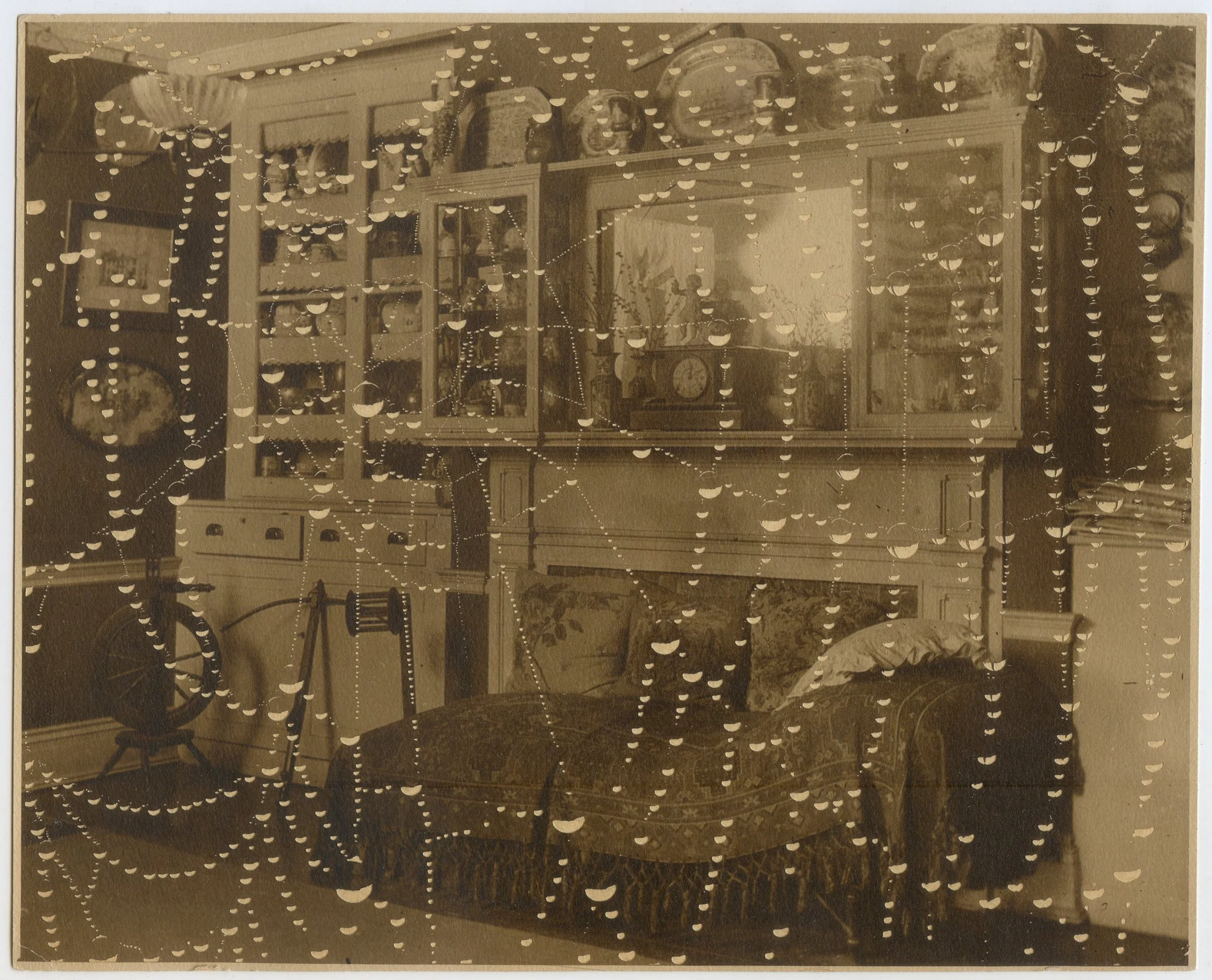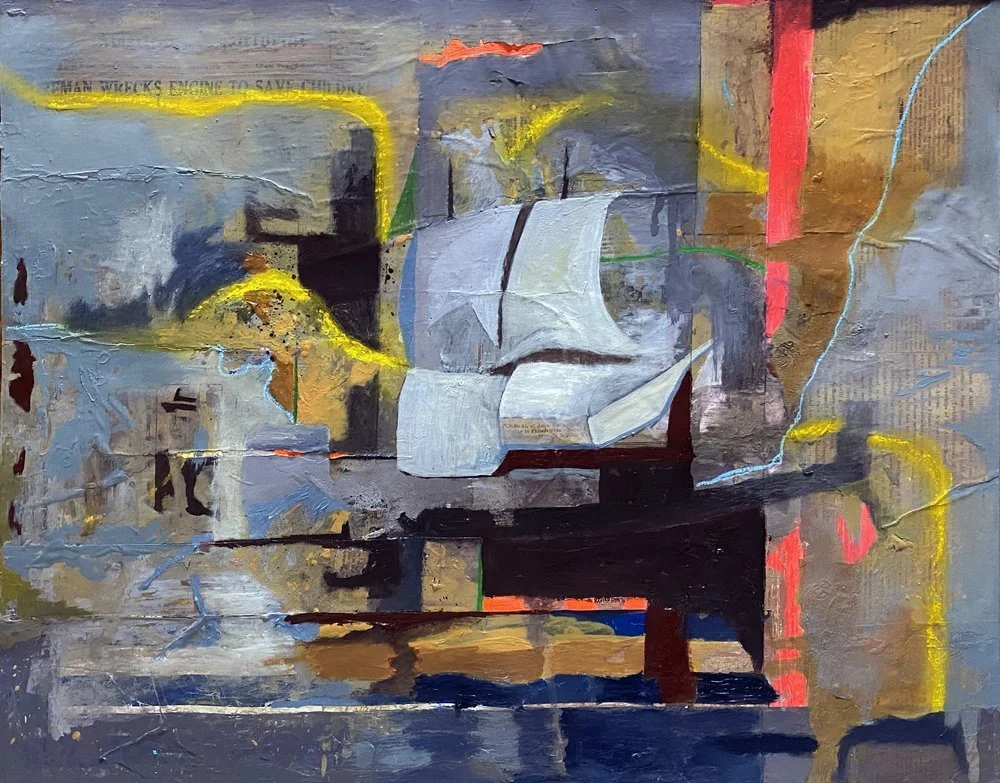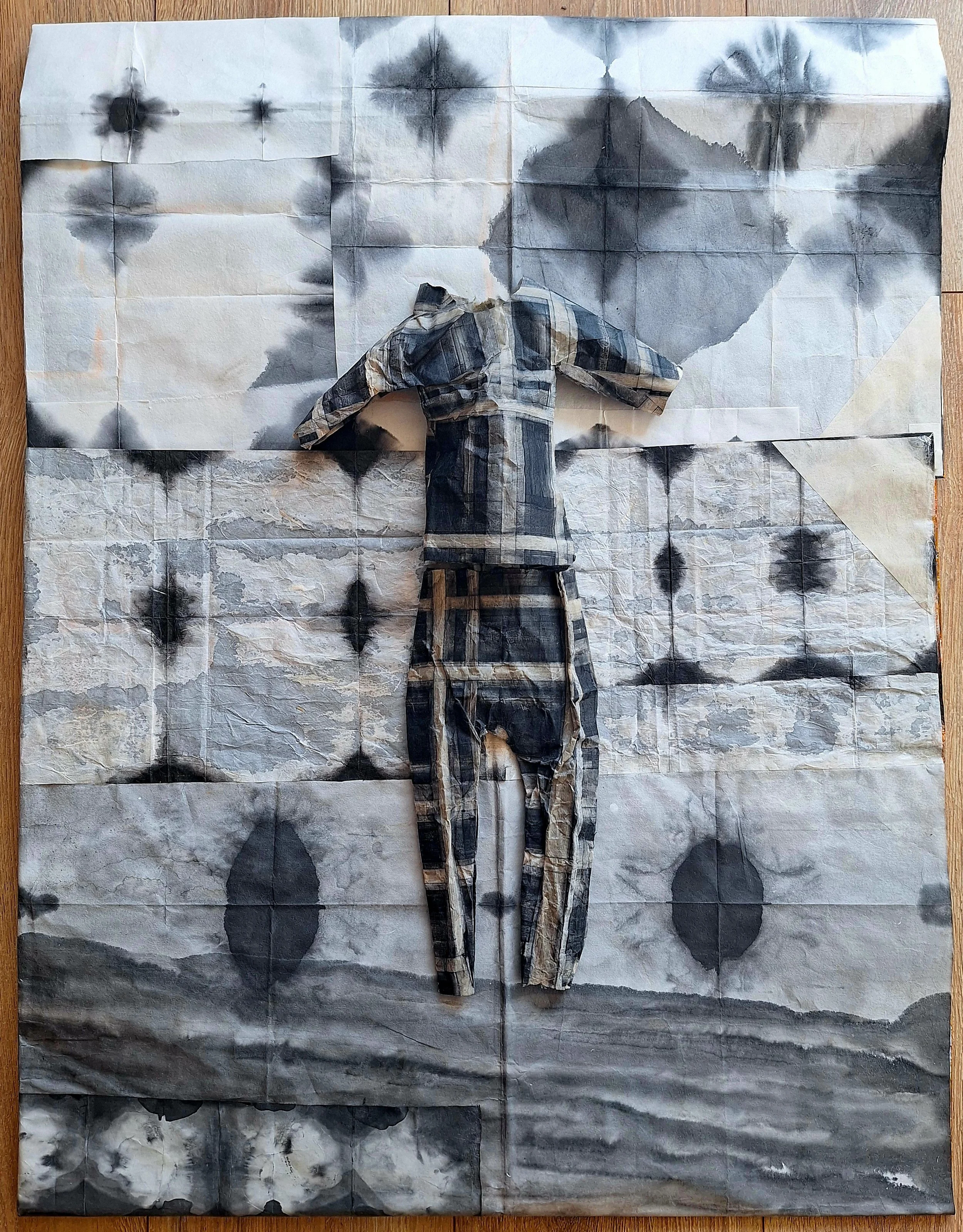“Mourning Rites” and “Love: A Brief History”
By Thomas Mar Wee
Sonia Xibei Jia - Immortal Flowers (2021), Acrylics, Silica sand and plaster paper on canvas, 150 cm x 200 cm
Image description: The painting depicts a parade of human figures, plant forms, and colored shapes rendered in a flat, abstract style, all of which are set against a dark-gray background. In the foreground, on the right, a woman whose face and hair are rendered in stone-gray is dressed in a robe that is white, pink, and red. She is slightly hunched and her eyes are cast downwards in a solemn expression. Touches of red, brown, and black form an abstract, blossoming patch below her. In the center of the painting, two figures, one older and one younger, are depicted in a similar style. They are partially obscured by dense, expressive brushstrokes in maroon, pink, and gray. In the midst of this conglomerate of colors are two stone-gray, headless, nude human bodies. In the left of the painting, an old woman rendered in the same style turns her head to look back at the other three figures with a concerned expression. At the top of the painting are long, thin, white tubes resembling tree trunks.
Mourning Rites
From the Book of Rites
I.
When one sees at a distance a coffin with the corpse in it
he should not sing.
When he enters among the mourners
he should not keep his arms stuck out
When eating with others
he should not sigh
When there is a body shrouded and coffined in his village
One should not sing in the lanes
When presenting himself at any mourning rite
he should have a sad countenance
When holding the rope
he should not laugh
When going to a burying-ground
he should not sing
II.
At the mourning rites for a parent, the son occupied the slanting shed
He slept on straw, with a clod of earth for a pillow
He spoke of nothing
except what related to the rites
III.
A son, who had hurried to the mourning rites of his father
bound up his hair in the raised hall
bared his chest
descended to the court
There, he performed his leaping.
The leaping over
he reascended
covered his chest,
and put on his sash
in an apartment to the east
Sonia Xibei Jia - The Flower I Could Never Resuscitate (2022), Oil on plaster, 28 cm x 38 cm
Image description: The image shows a flat, vaguely oval-shaped, plaster sculpture nailed to a white wall. On the surface of the plaster, yellow flowers with white stems are painted in a soft, subtle style against a beige background. Long cracks run through the plaster surface, rendering the flowers into fragments. The top right corner of the plaster, depicting two yellow flowers, is completely broken off from the rest. The edges of the sculpture are jagged and chipped.
Love: A Brief History
Dear Dad,
I have a lot to tell you.
The instinct, when confronted with telling a long, meandering story
to start from the Beginning:
[Odysseus, at the head of his host’s banquet table]
I. “In the beginning”:
The Word
And the Word made flesh
To begin, I’d have to tell you from the very first time
I ever felt the first flicker of Something
the overtones of that thing
I would learn, one day, to call love
For linearity’s sake, BEGIN
from the outer rings
And inch closer slowly. slowly. slowly.
to that central nexus
which dissolves everything
unto itself
the center
where space and time begin to skew and yaw
The place where there is
only Love
II. “Oh Father, where should I begin?”:
Another attempt:
To begin from the END:
To retrace, as if investigating the aftermath of a murder
tabulating the collateral damage, counting the victims
tracing backwards, meticulously
to piece together finally the event
and ultimately, deduce its First Cause
In this spirit, I offer you: “A Preliminary Proof of Love, via Inductive Reasoning”
III. “Love is a homecoming”:
I am learning the truth of this, with X
as if for the first time
On only our second meeting,
I feel as if granted a passage
A master key or thread [Ariadne’s]
which leads me back, to the places you left, twenty years ago
to the place of your father and mother
and their father and mother
and their father and mother
and their father and mother
and their father and mother….
Last night, X led me back
to our respective Pasts
with their unexpected convergences
—in their embraces, enwrapped, enraptured:
ourselves tumbling back
in free fall/flight
the “Eternal Return”
leaves us gasping
Coming up for air; After
in the perpetual twilight garden of this room
(this converted one bedroom apartment
on the gentrified outskirts of Chinatown)
again & again & again we resurface
for a glass of water
sip of lukewarm sake
to laugh
to piss
IV. “Lovers are always inventing”:
With X, unlike past lovers, I feel instead
that we are uncovering,,,excavating,,,raking away
layers and layers of silt // grime // sediments
accumulated in the intervening years to uncover
[in the spaces between our muscles]
That tenderest vein
of palest earth
which has not breathed air
for decades centuries millennia
And so perhaps
this sweat
This sweetest strain
pressing against our bodies
is merely us bumping against
the weight of History
As if making love
in the warm shadow of a mountain (swirled in mist)
at its base, in some budding grove ringed with trees
we speak
with the authority of the past
Enacting old Rites
in new tongues
And so,
if we occasionally
butcher these words
in our haphazard acts of translation—
Please Forgive Us
After all, there’s no map for us
or if there once was, it has long been lost &
only fragments have been preserved, hastily
in the Annals
by the poets and the singers
(who no one reads anymore)
V. “Silence”
Except, in the lapses
in the islands of silence
the Mountain
makes its own soft music
& if one is quiet enough
beneath the warbling of the dawn &
the rushing of the earth bestirring in its sleep
one can make out
distant tones
Sotto voce
The Mountain speaks:
Across Epochs, dynasties, centuries
it sings
An ancient song
One which we both know well
Almost by heart
Sonia Xibei Jia - Curing (2022), Oil on plaster, 30 cm x 35 cm
Image description: The close-up of a kiss is rendered in warm shades of orange and beige on plaster. The side profiles of two human heads are outlined in soft brushstrokes; each fills up half of the painting. Their lips, which are the same shade of dark red, meet in a kiss in the center of the painting. Their noses are pressed together. Other facial features are so subtle that they are almost indistinguishable. Cracks run across the plaster surface, resulting in a wrinkled texture. The center of the painting is uncracked and whole.
Thomas Mar Wee is a writer, editor, and poet living in Brooklyn. Their poetry was previously awarded a University & College poetry prize from the Academy of American Poets. A recent graduate of Columbia University, they currently serve as an assistant at a literary agency and are working on a novel.
*
Through various imagined narrations, Sonia Jia attempts to meditate on the complexity of precarious intimacies and heal from her childhood trauma. She believes that intimate relationships are always intertwined with conflicts between the urge to rely tightly on one another, based on the vulnerable nature of beings, and the inevitable gulf between individuals created by both the nature of reproduction, the ideology of individualism, and different personal traumas. Under these tensions, intimate relationships are often in precarious stages. However, she believes that these precarious intimacies, which surround us and overcome many difficulties in relationships, have the potential to dissolve the boundaries between beings and to construct profound solidarity between individuals. To examine the possibilities of intimacy, inspired by Georges Bataille’s incitement to the pursuit of non-utile work, she tends to collect those “irrational moments” in her life and turn them into narratives, such as dreaming, indulging, sexual activities, staring blankly, or even imagining death. In these reconstructed memories depicted in her paintings, she wishes to create realms where discontinuous beings can truly share emotions and eventually reach a stage of continuity.
If you’ve enjoyed reading this article, please consider making a donation. Your donation goes towards paying our contributors and a modest stipend to our editors. Singapore Unbound is powered by volunteers, and we depend on individual supporters. To maintain our independence, we do not seek or accept direct funding from any government.












“Like the man who wears a vest saying negotiator in a hostage situation, I want one that says prioritizer.” Three poems by Satya Dash.